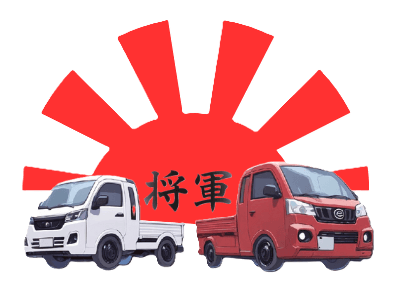Are Kei Trucks Legal In Wisconsin?
Wisconsin, known for its diverse landscapes and beautiful countryside, offers unique chances and challenges for using kei trucks. In this blog post, we'll explore whether kei trucks are legal in Wisconsin. We will break down the laws at both the federal and state levels, discuss the paperwork needed, and share stories from actual owners of these compact vehicles.

What Are Kei Trucks?
Kei Trucks Are
Kei trucks are compact vehicles designed to meet specific size and engine requirements set by Japanese regulations. Typically, these trucks have small engines under 660cc and are built to be easy to drive and efficient. Despite their small size, kei trucks are known for being tough and versatile, making them ideal for various jobs like farming, construction, and business needs.
What are the Federal Regulations?
Understanding Kei Trucks & Federal Regulations
If you're curious about kei trucks in Wisconsin, it's important to know about the rules set by the federal government. In the United States, there are strict guidelines for importing vehicles to ensure they are safe and meet environmental standards. Kei trucks, being imported vehicles, must comply with specific safety regulations established by the National Highway Traffic Safety Administration (NHTSA).
One key rule to note is the 25-year rule. This allows vehicles that are over 25 years old to be exempt from some of the usual safety requirements. This makes it easier to bring in and register older kei trucks, which many collectors and enthusiasts appreciate. However, newer kei trucks must still pass safety and emissions tests, which can be challenging because they are designed differently than typical U.S. vehicles.

What are the Wisconsin Regulations?
Registering Kei Trucks in Wisconsin
Through in-state registration, Kei trucks in Wisconsin can be driven on all public roads, highways and interstates.
If you're looking to register a kei truck in Wisconsin, it’s important to be aware of the specific steps and documents you’ll need. Here’s a simplified guide to help you through the process:
What You Need to Register Your Truck
To register a kei truck that you’ve imported, you should gather the following documents:
1. Application Form: Fill out the title application form.
2. Proof of Ownership: Provide a document that shows you own the vehicle. If it’s not in English, make sure you include a translation.
3. Sales Receipt: Include this if you have purchased the vehicle recently.
4. Odometer Statement: If applicable, you’ll need to provide a statement showing the miles on the truck.
5. Customs Papers: Include either the CBP Form 7501 or 3461, which helps confirm that the vehicle has cleared customs.
6. **Emissions Form: Complete and submit the EPA Form 3520, which demonstrates that your vehicle meets emissions standards.
7. Safety Compliance Form: Include the NHTSA Form HS-7, to show that your truck meets safety and emissions requirements.
Whats the workaround?
How to Drive Newer Kei Trucks on Wisconsin roads
At Shogun Imports, we assist individuals in getting their kei trucks registered so they can legally drive them on the roads in 45 states. These compact, distinctive trucks can bring significant happiness to their owners. Our reliable legal team handles all the necessary paperwork for registering your kei truck, even if it has license plates from a different state or is categorized as a utility vehicle. They ensure that everything complies with the local regulations in the states that accept driver's laws from other locations. The entire process can be completed by mail, and you don't have to reside in the state where you’re registering your truck. This way, you can enjoy your kei truck without any inconvenience!

Whats Vehicle Certification?
Vehicle Certification Labels Explained
When a vehicle is made to meet U.S. safety standards, it has a label called the Federal Certification Label (FCL). This label shows that the vehicle is safe and meets important federal regulations.
If a vehicle is originally made for another country, it can still be brought to the U.S. and modified to meet these safety standards. In this case, it will receive a different label known as the Registered Importer (RI) label.
Both vehicles—those with the FCL and those with the RI label—can be registered and given license plates in Wisconsin, regardless of the type of plate you want.
Can I Use Collector Plates?
Collector Plates for Limited Use in Wisconsin
In Wisconsin, you can still register vehicles that don’t have a federal certification label, but the title will indicate “NON-USA STANDARD.” These vehicles can be registered as special interest vehicles, which allows them to get collector license plates based on Wisconsin laws. However, if a vehicle has this label, it can only receive standard auto or light truck license plates if it was originally built to meet U.S. safety standards or if a registered importer has made necessary changes to ensure it does.
What are the restrictions in Wisconsin?
Understanding Mini-Trucks and Their Restrictions in Wisconsin
Mini-trucks, like Kei trucks, have some specific rules in Wisconsin. These small vehicles can’t be registered to drive on public roads. According to state law, the Department of Motor Vehicles won't allow registration for trucks made after 1969 if they don’t meet certain certification requirements, or if they are classified as Kei trucks. However, there are exceptions for certain vehicles, like ex-military trucks and special interest vehicles, which can still be registered if they meet certain criteria.

Off-Road Use in Wisconsin?
Using Kei Trucks Off-Road and for Farming
Kei trucks are popular in Wisconsin for activities like off-roading and farming. In rural areas and on private land, these small trucks can be used without many of the strict rules that apply to regular road vehicles. This flexibility makes them a great choice for farmers, ranchers, and businesses that operate in off-road environments.

